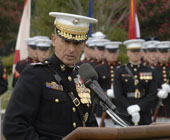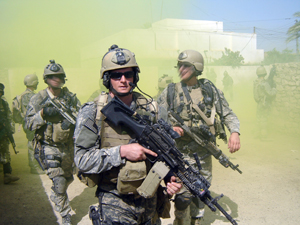 Honor, as it is so well defined in the book, Return to Order, by John Horvat, conveys the idea of an “authentic esteem given to all that is excellent in a social atmosphere of respect, affection and courtesy.”[1] It is something that cannot be bought and sold and it spreads an atmosphere of tranquility that we desire.
Honor, as it is so well defined in the book, Return to Order, by John Horvat, conveys the idea of an “authentic esteem given to all that is excellent in a social atmosphere of respect, affection and courtesy.”[1] It is something that cannot be bought and sold and it spreads an atmosphere of tranquility that we desire.
This pretty much describes my delight during this year’s Semper Fidelis dinner. The yearly event, put on by the Marine Corps University Foundation, always draws a spectacular array of dignitaries and this year was no different. Former Senator Jim De Mint was there, as was former Attorney General under President Reagan, Ed Meese. Also in the room were three former, and the current Marine Corps Commandant, Gen. Jim Amos. When I looked at the name tag of the person I would be sharing the evening with I was astonished. It was Col. Harvey “Barney” Barnum. I immediately recognized his name because he received our nation’s highest award for courage under fire, the Medal of Honor. It was, in my opinion, the best seat in the house.
Col. Barnum earned his distinction December 18, 1965 when his company was pinned down by a barrage of extremely accurate enemy fire. At the height of the battle, his company commander was mortally wounded and the radio operator killed.
With complete disregard for his own safety, [Col. Barnum] gave aid to the dying commander, then removed the radio from the dead operator and strapped it to himself. He immediately assumed command of the rifle company, and moving at once into the midst of the heavy fire, rallying and giving encouragement to all units, reorganized them to replace the loss of key personnel and led their attack on enemy positions from which deadly fire continued to come. His sound and swift decisions and his obvious calm served to stabilize the badly decimated units and his gallant example as he stood exposed repeatedly to point out targets served as an inspiration to all. Provided with two armed helicopters, he moved fearlessly through enemy fire to control the air attack against the firmly entrenched enemy while skillfully directing one platoon in a successful counterattack in the key enemy positions. Having thus cleared a small area, he requested and directed the landing of two transport helicopters for the evacuation of the dead and wounded. He then assisted in the mopping up and final seizure of the battalion’s objective.[2]
This jaw-dropping account of heroism most certainly merited our nation’s highest award for bravery. It was our country’s way of recognizing the personal excellence of a Marine who “went above and beyond the call of duty.” While Col. Barnum wears the symbol proudly, we sadly see this medal and the corresponding virtue of honor are being counterfeited so frequently in our country that one is left to wonder if the day is coming when it will become entirely meaningless.
During the conversation at dinner I expressed my sadness at the recent Supreme Court decision which declared it an expression of a person’s First Amendment rights to wear the very same medal without having earned it. He simply sighed in disgust. What more could he say? It is now the law of the land. It is so because, as Mr. Horvat explains so well, we have replaced the “rule of honor” with a “rule of money.”
This “rule of money” is an essentially utilitarian mindset which denies the value of anything transcendent like honor and judges the worth of the man, not by the courage in his heart, but the amount of money in his pocket. Such a rule and those who embrace it are incapable of fully appreciating the heroism of one who lays his life on the line for his friends since, for them, the fullness of life is not found in honor, but rather “a rule that reduces everything to terms of self interest, matter and utility.”[3]
The rule of honor and those who embrace it has the opposite perspective and can be summarized best in the marvelous Biblical quote from the Machabees, “it is better to die than live in a world that is devastated and without honor.”
 Although the economic consequences of sacrificing the “rule of honor” in favor of the “rule of money” might not be totally apparent, consider this. The man who lives by honor will sacrifice himself for the common good with as great a facility as he will lay down his life for a friend in combat. Such is the quality of honor: It seeks excellence in all things not just those that are materially convenient.
Although the economic consequences of sacrificing the “rule of honor” in favor of the “rule of money” might not be totally apparent, consider this. The man who lives by honor will sacrifice himself for the common good with as great a facility as he will lay down his life for a friend in combat. Such is the quality of honor: It seeks excellence in all things not just those that are materially convenient.
Col. Barnum is a case in point. He lends his valuable time as an advisory board member for the group Segs4Vets,[4] a non-profit organization that provides Segways for amputees who, like Col. Barnum, were willing to risk their lives for us. Those like Col. Barnum who live by a rule of honor feel bound to give something back because of the appreciation they have for higher values.
Compare this attitude with that of a corrupt CEO who is esteemed for the size of his bank account alone, even if he enlarged it through corrupt practices which impoverished his loyal employees.
 What America needs are men of honor capable of leading us during the trying times ahead. More than this, however, we need to adopt the rule they live by and make it our own. Until we replace the “rule of money” with the “rule of honor” we should not expect to find a solution for our financial woes.
What America needs are men of honor capable of leading us during the trying times ahead. More than this, however, we need to adopt the rule they live by and make it our own. Until we replace the “rule of money” with the “rule of honor” we should not expect to find a solution for our financial woes.
By Norman Fulkerson.
1.John Horvat, Return to Order, York Press, 2013, p. 266↑
2.From Col. Barnum’s Medal of Honor citation.↑
3.John Horvat, p. 265.↑
4.http://en.wikipedia.org/wiki/Segs4Vets↑


